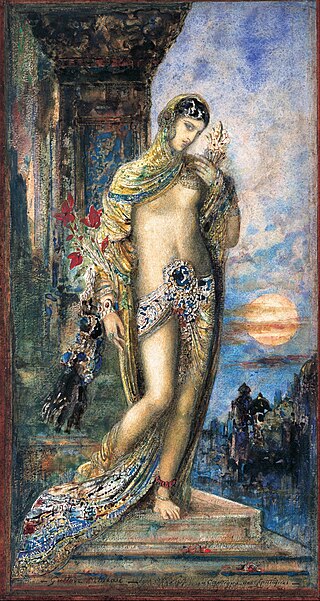
The Song of Songs, also called the Canticle of Canticles or the Song of Solomon, is a biblical poem, one of the five megillot ("scrolls") in the Ketuvim ('writings'), the last section of the Tanakh. It is unique within the Hebrew Bible: it shows no interest in Law or Covenant or the God of Israel, nor does it teach or explore wisdom, like Proverbs or Ecclesiastes—although it does have some affinities to wisdom literature, as the ascription to the 10th-century BCE King of Israel Solomon indicates. Instead, it celebrates sexual love, giving "the voices of two lovers, praising each other, yearning for each other, proffering invitations to enjoy".

Publius Ovidius Naso, known in English as Ovid, was a Roman poet who lived during the reign of Augustus. He was a younger contemporary of Virgil and Horace, with whom he is often ranked as one of the three canonical poets of Latin literature. The Imperial scholar Quintilian considered him the last of the Latin love elegists. Although Ovid enjoyed enormous popularity during his lifetime, the emperor Augustus exiled him to Tomis, the capital of the newly-organised province of Moesia, on the Black Sea, where he remained for the last nine or ten years of his life. Ovid himself attributed his banishment to a "poem and a mistake", but his reluctance to disclose specifics has resulted in much speculation among scholars.

Hero and Leander is the Greek myth relating the story of Hero, a priestess of Aphrodite who dwelt in a tower in Sestos on the European side of the Hellespont, and Leander, a young man from Abydos on the opposite side of the strait. Leander falls in love with Hero and swims every night across the Hellespont to spend time with her. Hero lights a lamp at the top of her tower to guide his way.
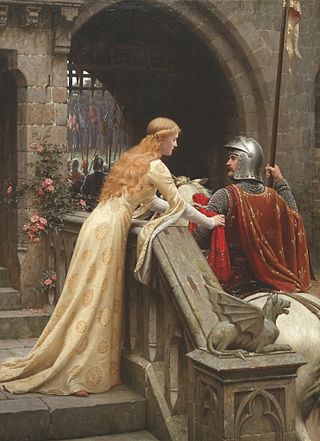
Courtly love was a medieval European literary conception of love that emphasized nobility and chivalry. Medieval literature is filled with examples of knights setting out on adventures and performing various deeds or services for ladies because of their "courtly love". This kind of love was originally a literary fiction created for the entertainment of the nobility, but as time passed, these ideas about love spread to popular culture and attracted a larger literate audience. In the high Middle Ages, a "game of love" developed around these ideas as a set of social practices. "Loving nobly" was considered to be an enriching and improving practice.

Joseph Alberic Twisleton-Wykeham-Fiennes, known as Joseph Fiennes, is an English actor of film, stage, and television. Fiennes is particularly known for his versatility and period pieces. Journalist Zoe Williams observed that "he seemed to be the go-to actor for English cultural history". His numerous accolades include one Screen Actors Guild Award and nomination for a British Academy Film Award.
Helter Skelter or Helter-skelter may refer to:

Chengyu are a type of traditional Chinese idiomatic expressions, most of which consist of four Chinese characters. Chengyu were widely used in Literary Chinese and are still common in written vernacular Chinese writing and in the spoken language today. According to the most stringent definition, there are about 5,000 chengyu in the Chinese language, though some dictionaries list over 20,000. Chengyu are considered the collected wisdom of the Chinese culture, and contain the experiences, moral concepts, and admonishments from previous generations of Chinese speakers. Chengyu still play an important role in Chinese conversation and education. Chinese idioms are one of four types of formulaic expressions, which also include collocations, two-part allegorical sayings called xiehouyu, and proverbs.

Le Roman de la Rose is a medieval poem written in Old French and presented as an allegorical dream vision. As poetry, The Romance of the Rose is a notable instance of courtly literature, purporting to provide a "mirror of love" in which the whole art of romantic love is disclosed. Its two authors conceived it as a psychological allegory; throughout the Lover's quest, the word Rose is used both as the name of the titular lady and as an abstract symbol of female sexuality. The names of the other characters function both as personal names and as metonyms illustrating the different factors that lead to and constitute a love affair. Its long-lasting influence is evident in the number of surviving manuscripts of the work, in the many translations and imitations it inspired, and in the praise and controversy it inspired.

Ernest Christopher Dowson was an English poet, novelist, and short-story writer who is often associated with the Decadent movement.

Carpe diem is a Latin aphorism, usually translated "seize the day", taken from book 1 of the Roman poet Horace's work Odes.

"The Passionate Shepherd to His Love" (1599), by Christopher Marlowe, is a pastoral poem from the English Renaissance (1485–1603). Marlowe composed the poem in iambic tetrameter in six stanzas, and each stanza is composed of two rhyming couplets; thus the first line of the poem reads: "Come live with me and be my love".

"The Last Rose of Summer" is a poem by the Irish poet Thomas Moore. He wrote it in 1805, while staying at Jenkinstown Castle in County Kilkenny, Ireland, where he was said to have been inspired by a specimen of Rosa 'Old Blush'.

Alberto Pincherle, known by his pseudonym Alberto Moravia, was an Italian novelist and journalist. His novels explored matters of modern sexuality, social alienation and existentialism. Moravia is best known for his debut novel Gli indifferenti and for the anti-fascist novel Il conformista, the basis for the film The Conformist (1970) directed by Bernardo Bertolucci. Other novels of his adapted for the cinema are Agostino, filmed with the same title by Mauro Bolognini in 1962; Il disprezzo, filmed by Jean-Luc Godard as Le Mépris ; La noia (Boredom), filmed with that title by Damiano Damiani in 1963 and released in the US as The Empty Canvas in 1964 and La ciociara, filmed by Vittorio De Sica as Two Women (1960). Cédric Kahn's L'Ennui (1998) is another version of La noia.

The Roman de Fauvel is a 14th-century French allegorical verse romance of satirical bent, generally attributed to Gervais du Bus, a clerk at the French royal chancery. The original narrative of 3,280 octosyllabics is divided into two books, dated to 1310 and 1314 respectively, during the reigns of Philip IV and Louis X. In 1316–7 Chaillou de Pesstain produced a greatly expanded version.
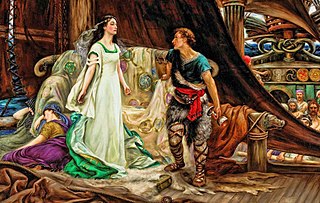
Tristan and Iseult, also known as Tristan and Isolde and other names, is a medieval chivalric romance told in numerous variations since the 12th century. Based on a Celtic legend and possibly other sources, the tale is a tragedy about the illicit love between the Cornish knight Tristan and the Irish princess Iseult in the days of King Arthur. It depicts Tristan's mission to escort Iseult from Ireland to marry his uncle, King Mark of Cornwall. On the journey, Tristan and Iseult ingest a love potion, instigating a forbidden love affair between them.
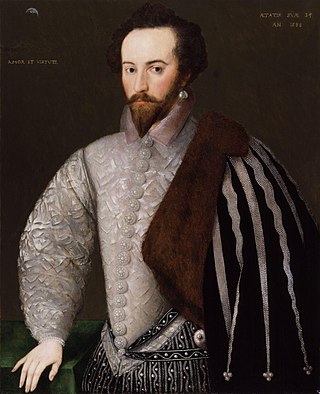
In English literature, The Nymph’s Reply to the Shepherd (1600), by Walter Raleigh, is a poem that responds to and parodies the poem “The Passionate Shepherd to His Love” (1599), by Christopher Marlowe. In her reply to the shepherd’s courtship, the nymph presents a point-by-point rejection of his offer of a transitory life of passion and pastoral idyll.

Various folk cultures and traditions assign symbolic meaning to the rose, though these are seldom understood in-depth. Examples of deeper meanings lie within the language of flowers, and how a rose may have a different meaning in arrangements. Examples of common meanings of different coloured roses are: true love (red), mystery (blue), innocence or purity (white), death (black), friendship (yellow), and passion (orange).
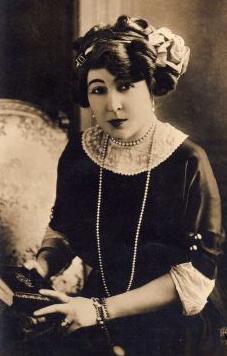
Louise-Rose-Étiennette Gérard, known as Rosemonde Gérard was a French poet and playwright. She was the wife of Edmond Rostand, and was a granddaughter of Étienne Maurice Gérard, who was a Marshal and a Prime Minister of France.
Bed of roses is an English expression which means an easy and peaceful life.

The Weasel and Aphrodite, also known as Venus and the Cat is one of Aesop's Fables, numbered 50 in the Perry Index. A fable on the cynic theme of the constancy of one's nature, it serves as a cautionary tale against trusting those with evil temper, for even if they might change their body, they will not change their mind.


















